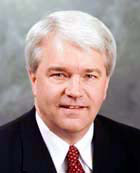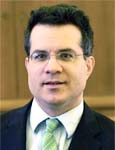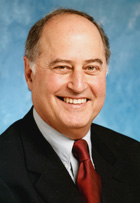WUSTL faculty from law and political science were quick to offer opinions to the news media about implications of a controversial Jan. 21 ruling by the U.S. Supreme Court that will allow corporations and unions to spend freely in elections, a decision many expect to shift the balance of political power.
Steven S. Smith, Ph.D., the Kate M. Gregg Professor of Social Sciences in Arts & Sciences, said the ruling could help politicians, such as Missouri’s Robin Carnahan, who have support from unions that are already active in political organizing.

In an interview with the St. Louis Post-Dispatch , Smith suggested that corporations may need to clear obstacles such as gaining clearance from boards of directors. And businesses, he added, may be reluctant to give heavily to just one candidate out of fear of backing the wrong contender and losing access in Washington.
“From the candidate’s point of view, obviously they are going to be confronting campaign ads in greater volume, earlier and deeper into their campaign from outside groups,” said Smith, a nationally recognized congressional expert and director of the Weidenbaum Center on the Economy, Government, and Public Policy at Washington University.
Gregory Magarian, J.D., a law professor at Washington University and formerly a law clerk for Justice Stevens, said the ruling could accelerate efforts by Democrats to appeal to corporate interests.

“If you’re Robin Carnahan and you want to avoid bringing corporate money down on your head, you might have meetings with big Missouri and national corporations and say, ‘Look, I’m not here to antagonize you,'” Magarian told the Post-Dispatch. “You’ve basically defanged reformist elements.”
(See also related Magarian news tip: SCOTUS campaign spending decision delivers blow to political process.)
Charles Burson, J.D., a Washington University law professor who has argued election law before the Supreme Court, said in an interview with the St. Louis Beacon that the court’s rationale is “pretty broad” and opens the door to corporate and union money. “This is a strong case to buttress those who think that the best way to deal with money in elections is simply disclosure.”

“What is so ironic,” Burson continued, “is that at a time when populism is so strong relating to large corporate interests, the court comes out and says we aren’t going to buy it and we’re going to open the doors to corporate money. The Massachusetts election looks like a manifestation of populism and the failure to deal with powerful banking interests, yet the court opens the door here. It is the court being out of step with the passion of the time, whether that’s a good or a bad thing.” Burson was chief of staff to Vice President Al Gore.
Bruce La Pierre, another Washington University law professor, has argued against campaign contribution limits in the Supreme Court. In an email response to the Beacon, he wondered about all of the “hand-wringing” among campaign finance supporters “about adverse effects” of the decision.

“If the foundations of our democracy are about to crumble,” he wrote, “why isn’t there some evidence of those problems from the 26 states that do not restrict independent expenditures by for-profit corporations?” he wrote. Justice Anthony Kennedy noted in his decision that more than half the states already permit corporate political expenditures.
La Pierre added, “Balancing interests in unfettered political speech and government regulatory interests may be difficult in some cases, but here it would appear there is nothing on the regulatory side of the scale.”